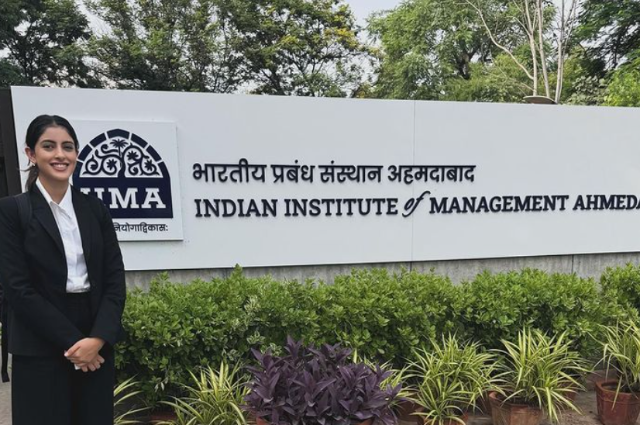Prejudice and discrimination based on gender persist because gender stereotypes are reinforced through a variety of channels, such as the media, socialization, education, and leisure activities. In addition to highlighting the pervasive prejudices that society still harbours against women, this article criticizes how modern society readily criticizes women who hold comparable success and power but ignore the accomplishments of powerful men. It focuses on Navya Nanda's experiences with online criticism regarding her achievements because of gender bias and examines different aspects of gender stereotyping and its effects on women's career advancement.
The Gendered Nuance of Privilege and Accomplishment
Amitabh Bachchan's granddaughter Navya Naveli Nanda recently declared her acceptance to the IIM Ahmedabad Blended Post Graduate Program (BPGP). The 26-year-old. Her accomplishment was praised by many, but the news also provoked a backlash on social media. The nature of the course she enrolled in was the main cause of the backlash. Critics of Reddit questioned the BPGP's validity, calling it "not even a real MBA." "It's a blended course with just a few weeks of on-campus learning," said one comment. The remaining content is available online. Without really working hard, these famous kids consistently manage to receive these ostentatious tags." Another user voiced their displeasure, claiming that powerful people like Navya use their connections to get admitted, avoiding the demanding application process that other students must.
In the case of Navya Nanda, it is evident that gender stereotypes remain pervasive and are perpetuated through various channels, including media portrayals as well as social, educational, and recreational practices. These channels often serve to reinforce gender biases and discrimination. Despite living in a modern society, our cultural narratives still doubt a woman's success, regardless of whether she hails from a privileged background or a more ordinary life. Navya's recent achievements serve to illuminate the multifaceted nature of gender stereotyping and its detrimental effects on women's career advancement across all layers of the patriarchal fabric of Indian society. This dynamic is particularly concerning as it often leads to the minimization and trivialization of women's accomplishments, highlighting the need for a critical examination of how societal attitudes continue to undermine women's progress in professional spheres.
Over the years, significant strides have been made in reducing many gender-related barriers and biases, yet gender stereotypes persist as a formidable obstacle in the advancement of women's careers. These stereotypes profoundly influence the availability of opportunities for women seeking to progress in their professional lives. They shape societal behaviours and expectations regarding occupational roles, perpetuating patriarchal norms both within the workplace and in broader societal contexts. According to data from the International Business Report (IBR) in 2020, women held only 29 per cent of senior management positions globally, highlighting the challenges they face in reaching leadership roles.
Furthermore, the World Economic Forum's 2017 report indicated that an average gender gap of 32 per cent exists across four critical domains: 'Economic Participation and Opportunity', 'Educational Attainment', 'Health and Survival', and 'Political Empowerment'. This figure represents a slight increase from the previous average gender gap of 31.7 per cent, signalling that progress toward gender equality remains slow and uneven. Despite the implementation of various policies and initiatives aimed at promoting gender equality over the past few decades, gender discrimination rooted in deeply ingrained stereotypes endures. This ongoing disparity underscores the need for continued efforts to challenge and dismantle these stereotypes, as they continue to hinder the full realization of women's potential in the workforce and society at large.
Moreover, the persistence of these stereotypes can create a self-fulfilling prophecy, where women may internalize societal expectations and doubt their abilities, thus further impeding their career progression. This cycle perpetuates the underrepresentation of women in management and leadership roles, reinforcing a corporate culture that may resist change. Gender stereotyping presents a substantial challenge that hinders the advancement of women in management roles.
This form of stereotyping manifests in various settings and serves diverse functions aligned with the specific demands of those environments. Stereotypical thinking fulfils multiple purposes, reflecting an array of cognitive processes and motivational factors that influence how individuals perceive and interact with one another in professional contexts. Understanding the cognitive and motivational processes behind gender stereotyping is crucial for developing strategies to combat these biases. By recognizing the contexts in which stereotypes arise and the functions they serve, organizations can implement targeted interventions aimed at promoting gender equity in the workplace. This not only benefits women striving for career advancement but also enhances overall organizational performance by fostering a more inclusive and diverse environment.
The Power of Female Agency in Shunning Stereotypes
Despite the criticism, many fans and followers defended Navya, arguing that her admission should not be rejected simply because of her celebrity background. One supporter commented, "Why do people think celebrities can't clear the entrance exam? Being born into a famous family doesn't mean you can't excel academically." Another echoed similar sentiments, adding, "It's unfair to attack her as if she has taken someone else's place. We should stop making assumptions without knowing the facts." Navya, typically quiet about online negativity, indirectly responded to criticism via her Instagram stories. She posted a photo of herself celebrating her acceptance into IIM-A with a cake and included a message highlighting the dedication and effort it took to achieve this milestone. Additionally, she liked comments from supportive fans, emphasizing that her success was the result of hard work and determination.
Conclusion
A significant change in societal attitudes will be key to transforming the gendered perspective on women's advancement. The negative reactions to Navya's achievements highlight the personal and socio-cultural influences that contribute to entrenched stereotypes, which in turn foster gender discrimination and hinder women's career development. To eradicate deeply ingrained gender stereotypes, it is essential to address and reshape grassroots perceptions of gender, challenging the patriarchal attitudes that marginalize women across social, economic, cultural, political, and religious spheres.

